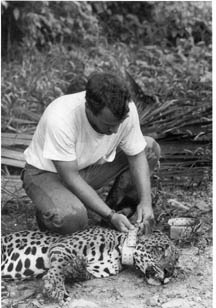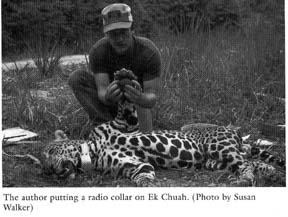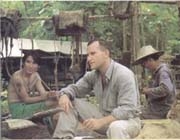 |
Fresh out of graduate school, Alan Rabinowitz was trying to decide the direction his life would take. Having received both his master's and PhD degrees in wildlife ecology from the University of Tennessee, Rabinowitz feared his career was on an academic track; he did not want to end up spending his days behind a desk.
Rabinowitz was invited on a hike in the Smoky Mountains with one of his former professors, Dr. Michael Pelton, an expert on black bears. Pelton introduced him to renowned zoologist, Dr. George Schaller, who quickly saw the passion Rabinowitz had for nature and offered him a research position in Belize. “Schaller asked me to go to Belize and look at the jaguar situation,” recalls Rabinowitz.
In 1979, Rabinowitz went to Belize for three months where he discovered that the country was full of jaguars. He came back and reported his preliminary findings in 1980. The Wildlife Conservation Society (WCS) then offered him a position to set up a long-term research project in Belize. Rabinowitz accepted the position despite the fact that nobody had ever captured jaguars or undertaken a radio study.
“I was fresh out of graduate school and thought I could do anything,” recalls Rabinowitz. In 1982 he headed to the Cockscomb Basin in the eastern part of Belize, where he planned to capture jaguars so he could put radios on them in order to track their behavior. He was there until the end of 1984, studying and tracking jaguars and learning about how they lived and what was posing a threat to them. According to Rabinowitz, these years in Cockscomb were rough.
 |
“I had a man killed by a poisonous snake and I was in a plane crash,” recalls Rabinowitz. Despite these tragedies, the research progressed and, by the end of 1984, Rabinowitz had convinced the Belizean government to lock up the Cockscomb Basin as a jaguar preserve. The area was given a no-hunting provision for the protection of the animals.
“Since then the area of protection has expanded to become the largest protected area of continuous forest in all of Central America,” says Rabinowitz.
The Maya Indians who had been killing the jaguars before are now the wardens who protect them. “The tourists started coming and they (the Maya Indians) started making more money by saving the jaguars than by killing them,” says Rabinowitz. “It's not a born-again enlightenment; it's a matter of economics.”
 |
Since his work in Belize, Rabinowitz has studied many different species of animals all across the world. He has observed the Smartran rhinoceros in Borneo, surveyed the clouded leopard throughout Asia, and conducted research on tigers, leopards, civets (the Asian equivalent of the raccoon), leopard cats, and mountain lions.
Rabinowitz traces his love for animals back to his childhood. He grew up in a rough part of New York with a problem. “I stuttered so badly I couldn’t even speak,” he recalls, saying he withdrew inside and developed a dislike toward people because of this problem. As a child he remembers two things. First, the only way he could express himself to the world at large was to write. Second, he communicated better with animals than with people, a skill he says is common to all people who stutter.
It is hardly surprising that, within his field, Rabinowitz is an accomplished writer. He has completed two books, Chasing the Dragon’s Tail - The Struggle to Save Thailand’s Wild Cats, and, Jaguar: One Man’s Struggle to Establish the World’s First Jaguar Preserve, which recounts his efforts to set up the preserve in Belize. He also has published the "Wildlife Field Research and Conservation Training Manual," which is published in a number of different languages to teach people skills for working in the wild. In addition, Rabinowitz writes regularly for Wildlife Conservation, a magazine published by the WCS.
Rabinowitz currently serves as Director of Science and Exploration for the WCS, running the ‘Global Carnivore Program’ which focuses on saving large carnivores worldwide. The exploration side of his job involves searching unexplored areas for new species.
“There are many places in the world which are like a Pandora's box of new discoveries,” says Rabinowitz. His latest findings are in Northern Burma where he has discovered the smallest deer species known to man.
Page created on 7/4/2004 9:40:26 AM
Last edited 6/28/2018 4:37:24 PM
 is a hero to many people
- involved in wildlife studies.
is a hero to many people
- involved in wildlife studies. 